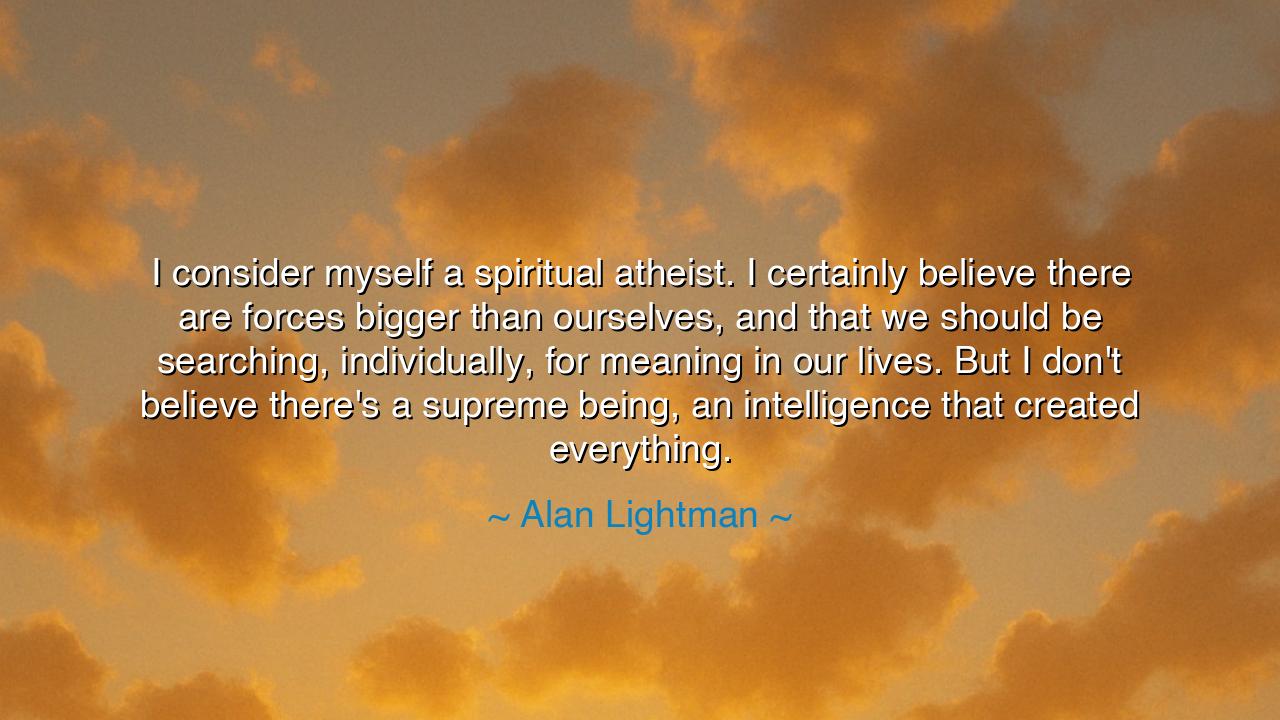
I consider myself a spiritual atheist. I certainly believe there
I consider myself a spiritual atheist. I certainly believe there are forces bigger than ourselves, and that we should be searching, individually, for meaning in our lives. But I don't believe there's a supreme being, an intelligence that created everything.






The words of Alan Lightman, both scientist and poet of the cosmos, shimmer with the rare balance of reason and reverence: “I consider myself a spiritual atheist. I certainly believe there are forces bigger than ourselves, and that we should be searching, individually, for meaning in our lives. But I don't believe there's a supreme being, an intelligence that created everything.” In this confession lies the voice of a man who stands at the crossroads of science and spirit—one who denies neither wonder nor logic, but instead seeks the sacred in the structure of existence itself. Lightman speaks not as one who rejects mystery, but as one who finds it everywhere. His “spiritual atheism” is not the coldness of disbelief, but the warmth of humility before an infinite universe that dwarfs the human heart, yet also gives it purpose.
Born a physicist and a philosopher, Lightman is known for exploring the fragile meeting place between the measurable and the ineffable. His words are the fruit of a mind that has peered into galaxies and equations, and yet found, even in their vast machinery, a whisper of the sublime. When he says there are “forces bigger than ourselves,” he speaks of gravity and time, yes, but also of beauty, compassion, love, and mortality—those unseen currents that shape our destinies as surely as the laws of physics shape the stars. His vision reminds us that spirituality need not depend on divinity; that meaning may bloom not from belief in a Creator, but from awe toward the creation itself.
In the ages of old, when man first looked upon the heavens, he saw gods in the thunder, in the rivers, in the fire that consumed and gave warmth. The ancients named the unknown divine because they wished to feel less alone in its immensity. Yet Lightman, child of a later age, sees the same sky and finds a different form of reverence. For him, the divine is not a personified being—it is the fabric of reality itself, the order that binds atoms to stars, the silent intelligence that emerges from chaos without needing a will behind it. His “atheism” is not rebellion, but understanding; his “spirituality” not submission, but gratitude.
To illustrate his wisdom, we might look to the life of Albert Einstein, who once said, “I do not believe in a personal God… but I am satisfied with the mystery of eternity, of life’s marvelous structure.” Einstein, too, gazed into the equations of nature and felt awe, not emptiness. He believed that the grandeur of existence itself was enough to inspire moral reverence. The two men, separated by time, speak with one voice: that faith and reason need not be enemies, that one can deny a deity yet remain profoundly attuned to wonder. They remind us that to bow before the mysteries of the universe is no less sacred than bowing before an altar.
Lightman’s teaching, though modern, carries the ancient wisdom of the philosophers. The Stoics of Greece and Rome once spoke of the logos—the divine order that governs the cosmos. They did not imagine gods with faces, but rather a universal harmony to which all beings belong. To live well, they said, is to live in accordance with this harmony. In Lightman’s “spiritual atheism,” we find an echo of this timeless insight. He urges us to seek meaning not in doctrine, but in discovery—to recognize that the act of searching, the lifelong pursuit of understanding and virtue, is itself the highest expression of the human spirit.
For what he teaches, ultimately, is personal responsibility in the quest for meaning. If there is no supreme intelligence guiding us, then the burden and the blessing of purpose rest within us. We must become our own seekers, our own interpreters of the vast and silent cosmos. Lightman’s words call us to awaken—not to worship, but to wonder; not to pray, but to perceive. He asks us to recognize that the sacred is not confined to temples or scriptures, but glimmers in the heartbeat of all living things, in the quiet spaces of thought, and in the compassion that binds one human soul to another.
Therefore, O listener, take this lesson to heart: whether you believe in a Creator or not, live as one who reveres creation. Let your curiosity be a form of prayer; let your gratitude be your temple. Seek not certainty, but understanding. When you gaze upon the night sky, feel both your smallness and your belonging. When you love, when you learn, when you act with integrity, you fulfill the very calling that Lightman speaks of—to find meaning in the immensity.
And remember this: the soul does not need a throne in the heavens to be divine. The sacred dwells wherever the mind is awake and the heart is alive. Whether you call it God, nature, truth, or wonder—it is all one. To be a spiritual atheist, as Lightman teaches, is to stand unafraid before the infinite, to honor it not with submission, but with awareness. It is to whisper, as the ancients once did to the stars: I may not know who made you—but I am in awe that you are.






AAdministratorAdministrator
Welcome, honored guests. Please leave a comment, we will respond soon